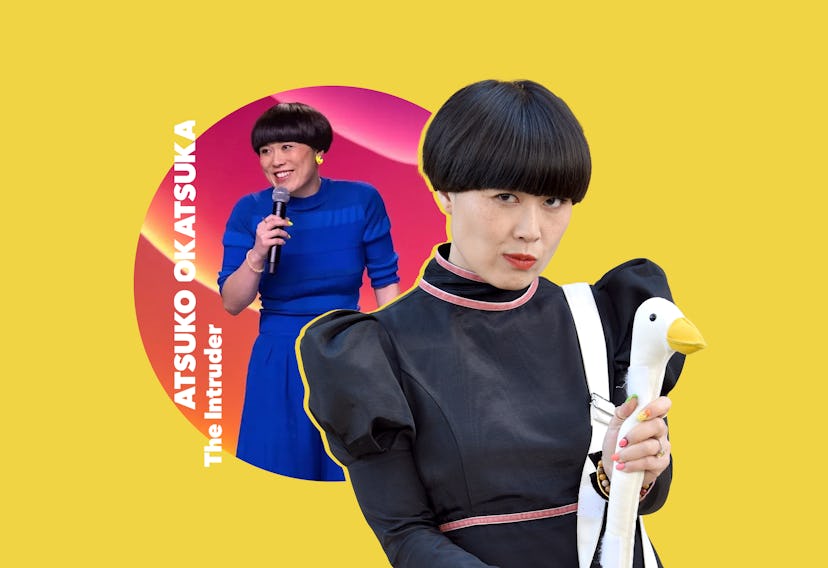Comedy
This Comedian Has Two Heroes: Margaret Cho & Her Grandma
“I’m the only comedian my family knows.”

It’s 5:50 p.m. on a Wednesday and the tables are already packed. At a comedy show, it’s rare to find that party-goers show up on-time, let alone 10 minutes early. When the host approaches the microphone to get the crowd ready for comedian Atsuko Okatsuka, the audience erupts in cheers.
Okatsuka’s special, The Intruder, debuted on Max in December 2022, shortly after Variety named her one of the top 10 comics to watch. In it, she jokes about being raised by her grandmother after immigrating to the United States from Japan at age 10, living undocumented for seven years, and her current life with her husband in Los Angeles.
“I want people to feel seen,” she told Bustle at the show put on by Secret Deodorant in June. “Sure, I talk about things that annoy me or that have been traumatizing or whatever, [but it’s to] build a community and make people feel not alone.”
She began performing in 2012, when she helped co-found Dis/orient/ed Comedy, the U.S.'s first mostly Asian American, female standup tour. It was only within the last five years, she tells Bustle, that she realized comedy could be an actual career. These days, she hangs out with Chelsea Handler and inspired a viral trend on TikTok (the Drop Challenge, which consists of slowly dropping to the ground in public at random moments).
“It's still hard for me to understand when I go to a city that I’ve never been to and the shows are sold out. And I'm like, how?” Okatsuka, 35, said. “As an immigrant and someone who didn't dare to dream big because I was so scared [they wouldn’t] happen, it's still hard to sometimes process and go, ‘Whoa, people are here to see me. The things that used to make me feel like a freak [are] actually really relatable.’”
It was certainly never a career that her mother and grandmother saw for her. “They're like, ‘OK, this is comedy. All right. We have no idea,’” says Okatsuka. “Now, I'm the only comedian my family knows.”
Below, Okatsuka shares her family’s influence on her work, her process, and what it’s like to make people laugh during stressful times.
What did it mean to you to be able to bring your grandmother out on stage at the end of your Max special?
Oh, it was so cool. It was a culminating moment of this woman who raised me. It was a SAG shoot, so she had to get paid $500 for even me bringing her out. She's like, "I get paid? I had no lines. I didn't say anything. I just waited." I was like, "You're welcome, Grandma. It's honestly, the very, very least I can do for everything you've done for me."
What life lessons did the women in your family teach you?
That no role is too small. There was a play that we were going to do in elementary school and we all had to audition. I got the role of the old woman, and I was so bummed. [My grandma] taught me that whatever role you get, whatever society decides of you, you do the best job at that. You take pride in that and put into it yourself and people will give back, because you're giving to them.
Who are your comedy heroes?
You really have to believe in yourself if you didn't always see people like you growing up. Margaret Cho was the first comedian I had ever seen perform on DVD. I was 15, and honestly, I was so shy and not very social. To watch something and go, “That could be me”— that's a level of confidence I didn't have back then. It took a while, but it took trailblazers like Margaret Cho to help keep that dream alive.
What’s your approach to humor?
You should always play to your strengths. I had a joke about feminism that was very subtle, but it was still very me, because I was silly at first. I [joke] about how I didn't know my husband had been doing the laundry for the past five years. It's a true story where my husband was like, “I thought you were doing it sometimes,” and I was like, “I really thought I was doing it sometimes, but I don't know how to turn the washing machine on. So I guess I've never actually touched it,” and then saying, “That is feminism.” That's the way I talk politics. I'm a sillier person, so I'm not going to be as preachy about it.
What does it mean to you to be in a career that’s all about making people laugh in such a crazy time?
I mean, it's literally our job. And for me, I thrive in chaos because of my upbringing. So if I can be that person in a chaotic moment that’s just like, “Hey, shush, look over here?” And then I get to make you laugh too, gosh, that's the only skill I have. I'm so happy to use it. I'm like an emotional lifeguard or something.